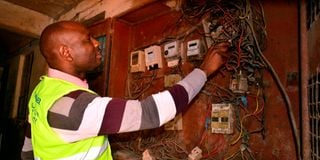Premium
Kenya Power to add 55,000 meters to self-reading plan

A Kenya Power employee inspects a meter box at an apartment building in Tassia Estate, Nairobi in February 2020. The firm is set to raise the number of post-paid meters on the self-reading service to cut billing errors.
Kenya Power plans to place an additional 55,000 post-paid meters under its self-read service within the current financial year as it deals with public outcry about inaccurate consumer bills.
Some 145,000 post-paid meters are currently under the scheme where customers confirm consumption units before payment.
“Self-reading of meters will empower our post-paid customers to proactively engage with us on all matters that relate to billing for their electricity consumption,” Kenya Power acting Chief Executive Geoffrey Muli said.
The firm currently has 2.1 million customers on postpaid billing while 6.8 million are on prepaid billing.
“It is targeted to enhance satisfaction among our customers through accurate and timely billing which will eliminate bill estimations and therefore reduce customer complaints arising from the same,” Mr Muli added.
The company last year introduced the self-reading service on the USSD code *977# where postpaid customers can register to read their meters at the end of their billing cycle and submit the readings.
Consumption trends
The USSD code also enables prepaid customers to retrieve the last three purchased tokens, which is helpful especially when customers want to refer to their electricity consumption trends.
Kenya Power said the monthly average customer transaction on the platform stood at 1.6 million in the year to June and it’s targeting to increase these to an average of two million by the end of the current financial year.
The utility now says it is ramping up awareness of self-reading to enable more customers to read their bills.
This year, Kenya Power procured 75,000 new smart meters to replace its old meters that are prone to tampering, denying it revenue through unpaid bills.
Unlike traditional accumulation meters, which simply record the total amount of electricity used, smart meters record the time of use in hourly or shorter intervals.
The firm has been struggling to translate its sales into revenue partly due to electricity theft, especially by large industrial customers and residents in informal settlements.
The firm said it had already installed 54,419 smart meters in small business customer premises and targeted to install a further 67,000 by June this year.
This also comes as Kenya mulls joining the list of countries that have rolled out smart electricity tariffs that will give consumers more control over their power bills as part of proposed reforms aimed at encouraging usage when supplies are cheapest.
A recent white paper published by the Energy ministry proposes to introduce smart tariffs and meters to enable consumers to track when electricity prices are at their cheapest and plan usage.
“Smart tariffs also enable consumers to have more control, choice and flexibility over their energy use depending on temporal needs, urgency and shifts in market prices that reflect demand and supply dynamics,” the white paper reads in part.
In this arrangement, there will be multiple electricity tariffs depending on the time of day to enable consumers to shift their consumption to off-peak times.





